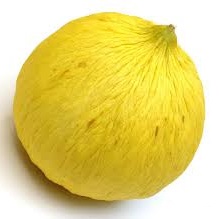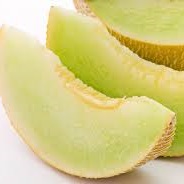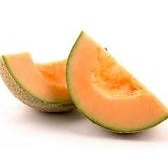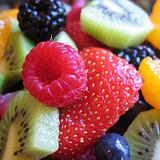Melon Nutrition Facts,
Health Benefits of Melon
All about Cantaloupe, Casaba and Honeydew melon nutrition facts, nutritional benefits of melon, calories in melon, melon and weight loss
There are many varieties of melon, but they are all deliciously juicy and refreshing. Maybe surprisingly, their nutrition content does vary. In the table below, we compare three of the most popular varieties, Cantaloupe, Casaba and Honeydew.
The Cantaloupe is recognised by its mottled grey green skin, orange flesh and is circular in shape. The Casaba has a yellow skin, creamy flesh and also round in shape. The Honeydew is similar to the Casaba, but oval in shape with a green tinge to the flesh.
All of these melons are very low in calories, ranging from just 28 to 36 calories per serving (100g or 3.5oz). Not surprising really given that 90% of the fruit is water. They are all extremely low in fat and contain no cholesterol, so they are ideal as a dessert.
With respect to the vitamin content, the Cantaloupe stands out as it’s full of beta carotene and vitamin C. It provides 68% of our daily recommend intake (RDI) of vitamin A, and 61% of vitamin C. The Casaba though provides a good source of vitamin B6. But all three provide modest amounts of vitamins and minerals shown below.
The Cantaloupe is thought to have anti-coagulant properties as researcher’s claim it contains adenosine, which may reduce the risk of stroke and cardiovascular disease. Melons are full of carotenoids which are believed to inhibit the growth of cancer cells. Melons digest very easily if eaten on their own.
With the exception of the honeydew variety, melons do not ripen once picked. You’ll know it’s ripe when there’s a slight softening to the touch, so choose carefully when purchasing.
Compare melon nutrition facts to the other fruits.
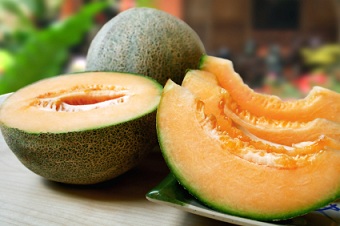
Nutritional Value of Melons
| Melon nutritional value per 100 g (3.5 oz) Scientific Name: Cucumis melo |
|||
|---|---|---|---|
| Proximates: | |||
| Nutrient |  Cantaloupe melon, raw |  Casaba melon, raw |  Honeydew melon, raw |
| Water | 90.15 g | 91.85 g | 89.82 g |
| Energy | 141 kJ (34 kcal) | 118 kJ (28 kcal) | 150 kJ (36 kcal) |
| Protein | 0.84 g | 1.11 g | 0.54 g |
| Carbohydrates | 8.16 g | 6.58 g | 9.09 g |
| Total Fat: | 0.19 g | 0.10 g | 0.14 g |
| Fiber | 0.9 g | 0.9 g | 0.8 g |
| Cholesterol | 0 mg | 0 mg | 0 mg |
| Minerals: | |||
| Calcium, Ca | 9 mg (1%) | 11 mg (1%) | 6 mg (0.6%) |
| Iron, Fe | 0.21 mg (1%) | 0.34 mg (2%) | 0.17 mg (1%) |
| Magnesium, Mg | 12 mg (3%) | 11 mg (3%) | 10 mg (2.5%) |
| Phosphorus, P | 15 mg (1.5%) | 5 mg (0.5%) | 11 mg (1.1%) |
| Potassium, K | 267 mg (6%) | 182 mg (4%) | 228 mg (5%) |
| Sodium, Na | 16 mg (0.7%) | 9 mg (0.4%) | 18 mg (0.8%) |
| Zinc, Zn | 0.18 mg (1%) | 0.07 mg (0.5%) | 0.09 mg (0.6%) |
| Copper, Cu | 0.041 mg (2%) | 0.060 mg (3%) | 0.024 mg (1.2%) |
| Manganese, Mn | 0.041 mg (2%) | 0.035 mg (1.8%) | 0.027 mg (1.4%) |
| Selenium, Se | 0.4 mcg (0.6%) | 0.4 mcg (0.6%) | 0.7 mcg (1%) |
| Vitamins: | |||
| Vitamin C | 36.7 mg (61%) | 21.8 mg (36%) | 18.0 mg (30%) |
| Thiamine (Vit. B1) | 0.041 mg (3%) | 0.015 mg (1%) | 0.038 mg (2.5%) |
| Riboflavin (Vit. B2) | 0.019 mg (1%) | 0.031 mg (2%) | 0.012 mg (0.7%) |
| Niacin (Vit. B3) | 0.734 mg (4%) | 0.232 mg (1%) | 0.418 mg (2%) |
| Pantothenic acid (B5) | 0.105 mg (1%) | 0.084 mg (1%) | 0.155 mg (2%) |
| Vitamin B6 | 0.072 mg (4%) | 0.163 mg (8%) | 0.088 mg (4%) |
| Folate (Vit. B9) | 21 mcg (5%) | 8 mcg (2%) | 19 mcg (5%) |
| Vitamin A | 3382 IU (68%) | 0 IU | 50 IU (1%) |
| Vitamin E | 0.05 mg (0.3%) | 0.05 mg (0.3%) | 0.02 mg (0.1%) |
| Vitamin K | 2.5 mcg (3%) | 2.5 mcg (3%) | 2.9 mcg (4%) |
| Percentages are relative to US Recommended Daily Intake (RDI) for adults. | |||
Author: Lana Soko
You Might Also Like:
Want to Learn More?
Like This Page?
|
Share This Page:
|
Search Our Site:

Free E-Book:
We Recommend:
Looking to get your body into great shape? Get the very best results for your efforts and money! Save your valuable time from surfing the internet. These are theBestselling Weight Loss Programs
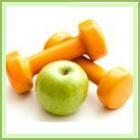
Programs that work and have thousands of satisfied customers worldwide!

 |
